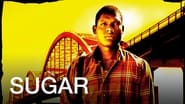Alex Deleon
SUGAR, American, 2008, directed by Ryan Fleck/Anna Boden, USA; Viewed at CINEFEST, Miskolc, 2013. Dominican baseball star Miguel "Sugar" Santos is recruited to play in the U.S. minor- leagues but there's a lot more to this than baseball.This film treats Immigration, race relations, and, yes, baseball ~ after a fashion, with an xlnt non-professional black cast. These are Notes to an American friend on the most exotic film of the week seen with a surprisingly lengthy Q&A with the director that went on until near Midnight. The title is "SUGAR", the name of the hero, and this American indie qualifies as 'exotic' here on three grounds; (1) the subject is American baseball -- more exotic in Hungary than soccer or rugby is in the States, (2) not only baseball, but Minor League, Bush league baseball, and (3) the whole business seen through the eyes of black Spanish speaking players from the Dominican Republic!You'll probably never get to see it because it was released in 2008 as an HBO/American Film Showcase production and has not had any public circulation to speak of, but i'm just telling you about it because it was so off-the-wall weird -- especially turning up in a place called "Meesh-colts" in the Hungarian outback!The whole first half hour takes place in the Dominican Republic, which shares half of the Caribbean island of Hispaniola (Columbus landed there) with Haiti, the poorest country in the world -- and the language spoken was a dialect of Spanish so thick I had to read the Hungarian subtitles to follow it. The main guy Miguel "Sugar" Santos is a young talented pitcher who is spotted by an American baseball scout and picked up by one of the low level Kansas City farm teams. From there it segues to a small baseball town in Iowa where Sugar is assigned to a very proper church going Grace-before-dinner religious white family who are baseball fans -- to live with them and learn English. They have a squeaky clean blonde daughter who will start making him forget his true black love back home, and it goes on from there to something very different from the success stories we are conditioned to expect from sports minded films of this kind.No time for details here but I can tell you that it ends up in Porto Rican New York with numerous unexpected twists and turns. Basically a Spanish language film inhabited mostly by black non-actors, which gives it a kind of semi-documentary authenticity you would never get with somebody like Denzil Washington in the lead.A real one-of-a-kinder that raised many questions from an intelligent Hungarian gathering - - far more than I thought it would. But no bull -- a black baseball flick in the backwoods of Hungary is almost an event in itself. I wouldn't say that I loved this film but it was certainly worth sitting through and sticking around afterward merely for its uniqueness if nothing else. A great baseball film it was not, but as a problematic Caribbean immigration film it works on multiple levels. And as a Black film all it needed would be a couple of songs by Lena Horne to make it an instant classic.
nikolay-golubev
I liked the movie. The picture, atmosphere, and documentary-feel casting are great. And I kept liking it until its middle. And then I started thinking, what is going on there. Why does the main character behave the way he behaves? What does the movie want to teach me or tell me? I couldn't find answers to any of these questions, except that "you should be a good and strong man who runs away from a challenge". And I don't think that's an idea someone wants to take away. Moreover, the challenge is almost not there. Just some disturbances with no major psychological significance to a strong guy like the main character. So, if you want to watch a beautifully made movie about giving up and running away from a challenge, watch this one. Otherwise, you're risking to be as confused as I am.
Turfseer
Sugar is the nickname for an aspiring Dominican ballplayer, Miguel Santos, played by newcomer Algeniz Perez Soto. We first meet Miguel in his hometown in the Dominican Republic, where he is sort of a legend due to his prowess as a star pitcher for the local baseball club. Everyone in the town looks up to these ballplayers with the expectation that they're all going to make it in professional baseball in the United States and bring home the bacon. Sugar is no exception and believes he's got what it takes to become a star professional baseball player. One is immediately impressed with the camaraderie amongst the aspiring ballplayers—they all seem to enjoy gently ribbing one another as to their ball playing abilities and obsession in making it to the big leagues.Miguel is good enough to be invited to spring training with the Kansas City Knights (a fictional name for the real life Kansas City Royals). The film's scenarists do an excellent job of depicting the culture shock when Sugar first arrives in the United States. First and foremost is the language barrier and Sugar must depend on his friend, Jorge, who he knows from back in DR, to translate for the Spanish speaking players (the players follow Jorge's lead when he orders French toast at a restaurant; later, a kindly waitress teaches Miguel the difference between 'scrambled' eggs and 'sunny side up'). Miguel does well enough to be promoted to Single A minor league team in a small town in Iowa.Miguel is placed with the Higgins family who have a history of taking in Dominican players in their home during their stint with this particular minor league baseball team. The Higgins are religious and Sugar ends up attending the Higgins' daughter's church youth group as well as actual church services. The father is the only family member who knows any Spanish at all but his skills are limited. I found it annoying that the rest of the family members (particularly the daughter) kept speaking English to Miguel knowing full well that he didn't know what she was saying. There was no attempt on the daughter's part (nor Miguel's) to break out a Spanish-English dictionary and at least try to communicate with the aid of at least a dictionary. Eventually, Miguel does pick up enough English to get by but it's made clear that until he learns enough of the language, he remains alienated during his sojourn in Iowa. Due to the culture clash, Miguel almost gets into big trouble when a group of locals at a bar start to pick a fight after Miguel is seen dancing with one of the local hotties.Miguel's friend, Jorge, is eventually cut from the team after his skills diminish due to the aggravation an old leg injury. Then Miguel sustains a knee injury and is sidelined for a few weeks. When he returns, his pitching skills also have diminished and he resorts to taking pills (steroids?) to enhance his performance. While successful for a couple of innings, by the midpoint of the game, Miguel beans an opposing batter and a fight ensues between both teams. While the fight is going on, Miguel appears to be in a complete daze, obviously unable to handle the drugs he's just put into his system. The manager then relegates Miguel to the bullpen, which only serves to intensify his depression.Some internet posters find it unbelievable that Miguel would so easily give up his baseball career after deciding to leave the team and take off to New York City. Not every aspiring ballplayer will have the same reaction. In Miguel's case, he not only realized that he wasn't good enough to make it in the big leagues, he was also put off by the way the team wasn't willing to be patient with his friend Jorge who, according to Miguel, "had worked so hard". Miguel also correctly assessed the situation that he would be cut from the team and didn't want to endure the humiliation of being told he was no longer wanted by them.The film's denouement highlights Miguel's travails in NYC where he struggles to find a job and tries to figure out what he wants to do with the rest of his life. Eventually, he takes a job as a busboy and becomes friends with the owner of a carpenter shop, who takes him in when he runs out of money which he was using to pay for a room at a flea bag hotel. Miguel's friend allows him to work at the shop for free where he builds a table which he plans to send to his mother back in DR. The final scene shows Miguel playing sandlot baseball with other Dominican ballplayers who gave up their dream of playing professional baseball. No longer feeling pressure to succeed in a 'career', Miguel now seems more content in his new life and can enjoy playing baseball simply for the fun of it.It's refreshing to see a film about an ordinary Hispanic guy who's not a criminal. There's been a tendency to focus more on the criminal behavior in the movies today involving Hispanic culture. Although 'Sugar' lacks a discernible antagonist, the focus is really on Miguel's internal arc, as he comes to grips with the fact that he really isn't cut out to be a ballplayer. The introverted Miguel isn't really much of a complex character and hence 'Sugar' will not be remembered for big dramatic scenes. But in its own quiet way, 'Sugar' ably reminds us that an aspiring ballplayer's 'Field of Dreams' does not always end up inside a major league ballpark.
ccthemovieman-1
Did you ever watch a movie and think, "Eh, this is okay but nothing great" and then, when it was over, you said, " "Wow, that was really good!?" That's "Sugar," a film you may not quite appreciate how good it is until it's over, and then you think about it for awhile.What made it so good, I thought, was the amazing realism with the dialog. If I hadn't read that this was movie with actors, I would have sworn I was watching a documentary.We follow a young guy from the Dominican Republic about 19 who is hoping to become a Major League baseball player. If you follow baseball, you already know there are a lot of good players from the Dominican. "Miguel 'Sugar' Santos," played by first-time actor Algenis Perez Soto is a pitcher in the Kansas City organization, but most of the baseball in seen in a small town in Iowa, where Santos is assigned to play Class A ball as his first stepping stone to the Major Leagues. In one scene, I saw a sign on a business that said "Davenport" and the ending credits list Quad Cities as a place of filming. It's in Eastern Iowa right on the Mississippi River.In the last 40 minutes, the film takes place in New York City as our ballplayer gets discouraged and takes a bus to The Big Apple to see his friend and to see Yankee Stadium, where he has dreams of playing. This film does not have the normal successful-happy ending, and that makes it all the more realistic. It's not a sad ending, either, as our hero makes do with what he has and gets help from some nice people....and simply gets on with his life and plays baseball simply for the joy of it on weekends.The best part of this film, I thought, was the realistic dialog that went with that realistic story. Everybody from the ballplayers, to the Higgins family in Iowa who housed "Santos," to the Iowa manager and the all the folks he met in New York City all sounded like the real deal. This movie does not have the feel of something made up; it looks and sounds very authentic.Although made for an Hispanic audience, with most of the language in Spanish, it also was for North Americans, to open our eyes what it's like for all these Latin American players who come to the states to play professional baseball and can't speak English. This is baseball's version of "Lost In Translation."Yes, the story has a few flaws and it's slow at times, but its definitely worth watching and can lead to some interesting discussions.







